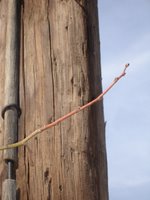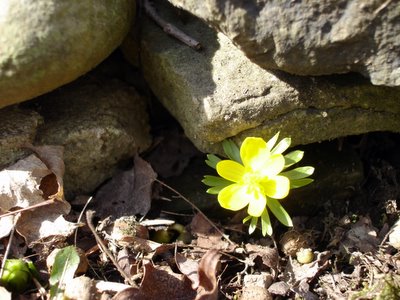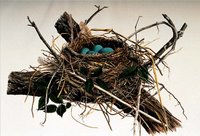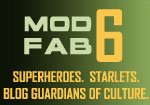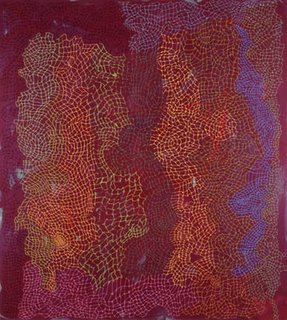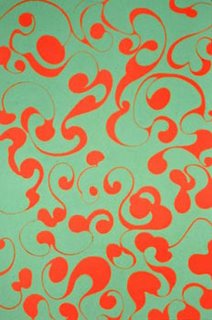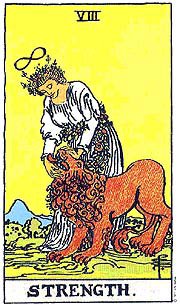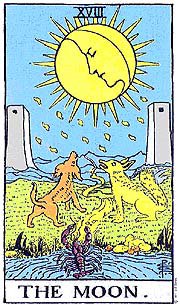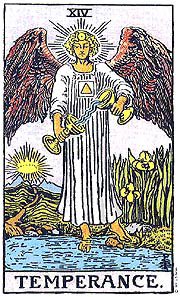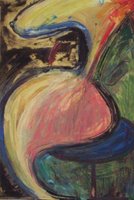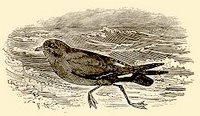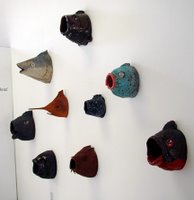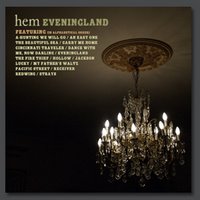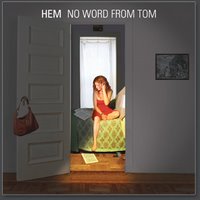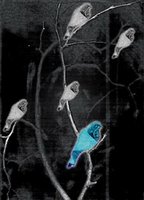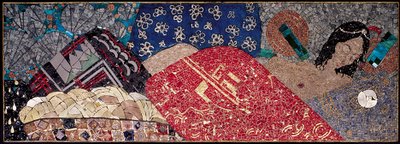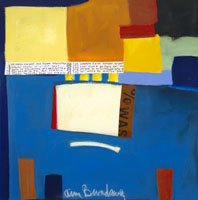You will perceive that I am as often talking to myself, perhaps, as speaking to you.
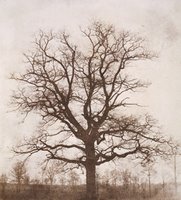 I am in training, as some of you may already be sussing out. I am in training for something as big as running a marathon, building a boat, walking cross-country, writing a villanelle. I am turning, heliotropic as I've already confessed to being, back toward something from which I fled half my life ago and to which I haven't looked back in any sustained way since. These posts are my practice laps, my technique shapers, my ways of relearning how certain flows and drags and slices through a given medium feel. I am in training for an audacity that I can feel coming closer. I am going to be ready to meet it this time. It will still be frightening, but now I know better what kind of fear I'll be facing: the fear not of failing but of embracing yet another part of what I'm actually meant to be doing with my life, and of having to admit that perhaps those old dreams of mine knew better than I've known since what my life's vectors would actually be.
I am in training, as some of you may already be sussing out. I am in training for something as big as running a marathon, building a boat, walking cross-country, writing a villanelle. I am turning, heliotropic as I've already confessed to being, back toward something from which I fled half my life ago and to which I haven't looked back in any sustained way since. These posts are my practice laps, my technique shapers, my ways of relearning how certain flows and drags and slices through a given medium feel. I am in training for an audacity that I can feel coming closer. I am going to be ready to meet it this time. It will still be frightening, but now I know better what kind of fear I'll be facing: the fear not of failing but of embracing yet another part of what I'm actually meant to be doing with my life, and of having to admit that perhaps those old dreams of mine knew better than I've known since what my life's vectors would actually be.
It's not been uncommon for me to whinge about a lack of models for my life--some of you have gotten this earful first-hand--as if no woman in the history of the world had ever been single at 29 or uninterested in having babies. Nor has it been uncommon for me to realize, with relief, that some of the figures from whom I draw my greatest sustenance are, in fact, still viable models, chronologically speaking (which is to say, in the least intellectually rigorous but perhaps most knee-jerk emotionally satisfying way possible). Virginia Woolf's first novel? Published in 1915, when she was 33. George Eliot's elopement with the love of her life? Happened in 1854, when she was 33. Her first fiction? 1857, when she was 36. Elizabeth Barrett's elopement with her poet-lover Robert Browning (penner of the single best opening line for a first love letter, ever: "I love your verses with all my heart, dear Miss Barrett")? 1846. When she was 40. After which her father never spoke to her again.
This morning, I'm warming my brain up for an onslaught of Jane Eyre (for the section we're discussing this afternoon is truly the onslaught, simply exhausting in the extravagance of its anguish) by reopening the slim volume I bought the day of the pageant, Henry David Thoreau's Letters to a Spiritual Seeker. Thoreau's age while writing the earliest of these letters to a friend, chiefly about figuring out what he's going to do in the world (make pencils in order to live? do surveying projects in order to feed himself and pay off the debt from an early book's utter failure?)? 31-33.
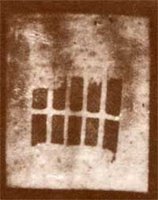 The main point of all this circling is to get you to the passages that look as though they'll be talismanic today, as the weather lowers and the wind picks up and I continue striding around purposefully, doing my daily work but also bearing around a pretty great burgeoning secret, a plan for myself that gets me downright giddy when I think about it, not least because it feels so utterly possible, even necessary, and yet has hit me up so unexpectedly, just when I thought everything in my life was settling down into patterns, fixing to be a particular way for the long haul. It continues to be a reassurance to me that both Woolf and Eliot also abjured child-bearing, for one reason and another; I add this point lest anyone misread my brazen cooptation of language that chiefly gets used for biological reproduction.
The main point of all this circling is to get you to the passages that look as though they'll be talismanic today, as the weather lowers and the wind picks up and I continue striding around purposefully, doing my daily work but also bearing around a pretty great burgeoning secret, a plan for myself that gets me downright giddy when I think about it, not least because it feels so utterly possible, even necessary, and yet has hit me up so unexpectedly, just when I thought everything in my life was settling down into patterns, fixing to be a particular way for the long haul. It continues to be a reassurance to me that both Woolf and Eliot also abjured child-bearing, for one reason and another; I add this point lest anyone misread my brazen cooptation of language that chiefly gets used for biological reproduction.
So, Thoreau. The rest of this entry will be yet another addition to this online commonplace book, because now the time is here, and then some, for learning yet again how Jane responds when Rochester seems "a man who is just about to burst an insufferable bond and plunge headlong into wild license."
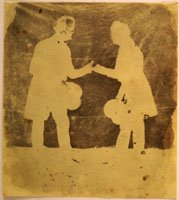 Letters to a Spiritual Seeker is a selection of Thoreau's decades-long correspondence with a slightly older man named Harrison Blake, who wrote to Thoreau about six months after he'd finished his sojourn at Walden Pond and asked of him, "Speak to me in this hour as you are prompted." The aphorism-seeker in me is gleaning as I read--fully aware, in case you're concerned, that my earnestness has always conjured some of my most dangerous temptations:
Letters to a Spiritual Seeker is a selection of Thoreau's decades-long correspondence with a slightly older man named Harrison Blake, who wrote to Thoreau about six months after he'd finished his sojourn at Walden Pond and asked of him, "Speak to me in this hour as you are prompted." The aphorism-seeker in me is gleaning as I read--fully aware, in case you're concerned, that my earnestness has always conjured some of my most dangerous temptations:March 27, 1848.
Pursue, keep up with, circle round and round your life as a dog does his master's chaise. Do what you love. Know your own bone; gnaw at it, bury it, unearth it, and gnaw it still. Do not be too moral. You may cheat yourself out of much life so.
May 2, 1848.
I am too easily contented with a slight and almost animal happiness. My happiness is a good deal like that of the woodchucks. [Which is a particularly interesting thing for this particular writer to say, since one of the most famous lines from Walden--the line about how in wildness is the preservation of the world--immediately precedes Thoreau's expressing a blazing desire to eat a woodchuck raw. As one of my dear friends here once pointed out in a lecture I was attending, L.L. Bean and the Nature Conservancy and all those other groups that put "in wildness..." on t-shirts and bumper stickers tend to leave out the part about the woodchuck.]
May 2, 1848.
My only integral experience is in my vision. I see, perchance, with more integrity than I feel.
April 3, 1850.
Let things alone; let them weigh what they will; let them soar or fall. To succeed in letting only one thing alone in a winter morning, if it be only one poor frozen-thawed apple that hangs on a tree, what a glorious achievement! Methinks it lightens through the dusky universe.... It is not when I am going to meet him, but when I am just turning away and leaving him alone, that I discover that God is. I say, God. I am not sure that that is the name. You will know whom I mean.
April 3, 1850.
[This bit is my favorite for today.]
Men make a great ado about the folly of demanding too much of life (or of eternity?), and of endeavoring to live according to that demand. Is it much ado about nothing? No harm ever came from that quarter. I am not afraid that I shall exaggerate the value and significance of life, but that I shall not be up to the occasion which it is. I shall be sorry to remember that I was there, but noticed nothing remarkable. Never flinch. Be sorry to remember that you were there but noticed nothing remarkable. I am talking to myself, perhaps, more than I am speaking to you. Remember that moment in Beloved when Sethe remembers being told, as a child, the story of her mother's middle passage? "I am telling you, small girl Sethe," says Nan, the woman who is telling her the story, "I am telling you." This morning, I am telling myself, and I will keep telling myself, and eventually, you will know that I am telling you, too.
Never flinch. Be sorry to remember that you were there but noticed nothing remarkable. I am talking to myself, perhaps, more than I am speaking to you. Remember that moment in Beloved when Sethe remembers being told, as a child, the story of her mother's middle passage? "I am telling you, small girl Sethe," says Nan, the woman who is telling her the story, "I am telling you." This morning, I am telling myself, and I will keep telling myself, and eventually, you will know that I am telling you, too.
sources for, and a note about, today's images: I had the perfect Thoreau image to give you, but I don't want to flout the "do not reproduce" instruction at the bottom of its originating page, and so I'll let you find your way there yourself. What I love about this one is that it's so close to the way I spend every one of my mornings, except that instead of a pencil and notebook--and, you know, the top hat, which I only wear some days--I sit here in bed with my laptop and whatever I'm teaching later in the day. Instead of this image, you're getting a couple of Henry Fox Talbot's "photogenic drawings" and early photographs. Henry Fox Talbot, in case you don't know, was the English counterpart to France's Daguerre; the two men basically invented photography at the same time. 1) "The Oak Tree" (mid-1840s) comes from The National Gallery of Art; 2) "The Oriel Window" (1835) (which may well be upside down, something that I also like) comes from ThisPublicAddress.com; 3) "The Handshake" (1842) comes from Hans P. Kraus, Jr.'s member page at PADA; 4) "Wrack" (1839) comes from The Metropolitan Museum of Art.

